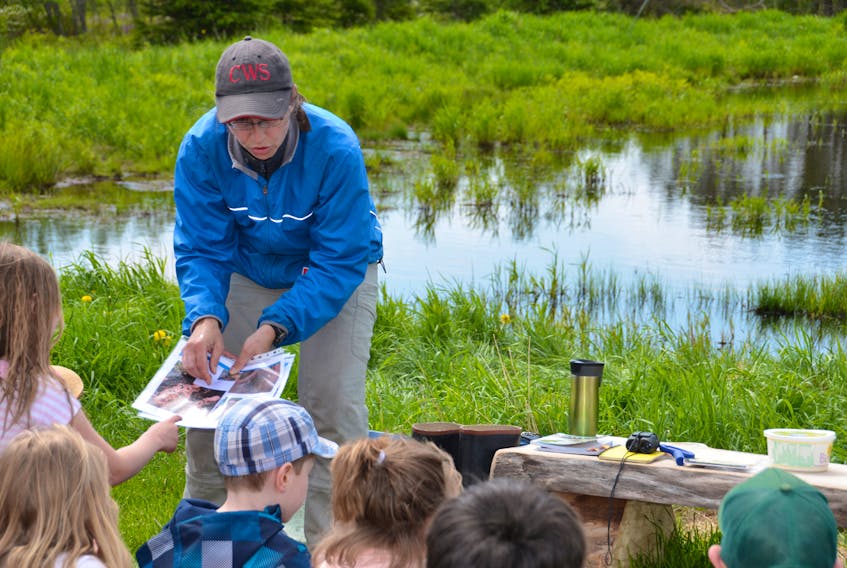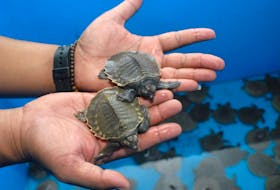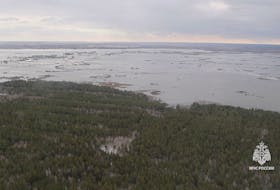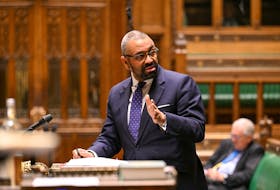SACKVILLE, N.B. – The Tantramar region will once again get a significant chunk of provincial funding to invest in environmentally-friendly projects this year.
More than $330,000 will be injected into the local region for a variety of environmental initiatives in 2018, ranging from wetlands education to climate change adaptation to water quality monitoring.
The money will come from this year’s Environmental Trust Fund (ETF), which will see investments of more than $6.5 million put into 227 community-based projects throughout the province.
EOS Eco-Energy Inc. is one of the local organizations being granted funds through this year’s ETF, receiving two grants to support their work.
One will be used to start a long-term water quality monitoring program in the Tantramar River Watershed. The funds ($35,000) will be spent on collecting and analyzing water quality samples throughout the watershed, and encouraging watershed stewardship through outreach and education programming.
"There is a great need for water quality monitoring to analyze the ongoing impacts on water quality and quantity within our province,” explained Kelli-Nicole Croucher, EOS Eco-Energy’s watershed coordinator. “I am very excited to start our monitoring program to increase the understanding of issues within our watershed and how they connect to climate change in our region.”
The second ETF grant will help EOS continue to implement local climate plans across Tantramar. The $45,000 will be used for a public workshop series, Tantramar Climate Change Week, the Tantramar Climate Change Adaptation Collaborative, and to address climate-related stress.
“We are very thankful to have the support of the Environmental Trust Fund as we continue to help the Tantramar region reduce and adapt to climate change,” said Amanda Marlin, executive director with EOS.
Funding of $23,500 has also been granted to the Tantramar Regional Centre of Expertise on Education (RCE) for the design and implementation of an outdoor environmental education program at Marshview Middle School. Similar to a program established a few years ago at Salem Elementary School, also by RCE, this latest project will be developed with Grades 5 to 8 in mind.
Michael Fox, chair of Tantramar RCE, said students have already begun working this year on preparing the inner courtyard at Marshview for the project and “with this grant, we can now move on to the next phase.”
The outdoor environmental education space, which will be developed in partnership with students, teachers and parents at Marshview, will provide hands-on learning opportunities, interdisciplinary activities from the approved curriculum, a greater student appreciation for the outdoors and nature, and outdoor experiential learning activities, said Fox. It will also help develop the school courtyard into an active learning space for education for sustainable development, climate change awareness and the introduction of a recycling and waste auditing program, as well as a composting program.
“The ETF grant provides a significant opportunity in purchasing the needed equipment and landscaping and gardening materials required in the operation of this outdoor project,” said Fox.
The town of Sackville was also the recipient of an ETF grant ($28,500), funds that will be used to help modernize and upgrade the ‘Waterfowl Park welcome centre’ at the tourist bureau as the community gets set to celebrate the park’s 30th anniversary.
“This project will allow us to replace our dated display at the visitor information centre with more modern, interactive displays to help educate visitors about the important natural features of the area,” said Ron Kelly Spurles, Sackville’s manager of tourism and business development.
Kelly Spurles said the displays will include: a working interactive model of an Acadian aboiteau; a large-scale interactive hands-on model of the region’s watershed; an interactive multi-media presentation on the history of the area, including the history of the park and marshes, and how the land was reclaimed as farmland by the Acadians; and an interactive multi-media presentation on the flora and fauna in the park and best ecological practices for managing the natural assets of the park and protecting the species who use it as their home. The multi-media presentations will include a video presentation, a knowledge acquiring game, puzzles and other devices aimed at teaching content through active learning techniques.
Community Forests International (CFI) has also been granted $60,000 for its ‘Climate - Smart Forestry’ project.
Megan deGraaf, forest ecologist with CFI, said the Sackville-based organization has been working for more than seven years to bring forest carbon offsetting opportunities to small private woodlot owners in the Maritimes, including developing the tools and community access for these kinds of projects to work. CFI has even established a pilot site at Whaelghinbran Farm, near Sussex, and has, over the past few years, identified gaps and barriers and looked at ways to resolve them.
“This newest ETF-funded project is just such one of those gap-filling projects,” said deGraaf.
She said climate change is having an effect on tree species and the composition of Maritime forests and will continue to impact the growing conditions in the future.
“One thing that is not well understood is how we can manage our forests now to reduce the scale of changes that will be brought about by climate change.”
With the ETF funds, CFI will be collaborating with the Maritime College of Forest Technology to produce a how-to manual for woodlot owners, foresters, and forest technicians, so all partners can collectively start working with our forests to become more adaptive to climate change, and to mitigate climate change by storing as much carbon as possible. CFI will also be hosting a Climate-Smart Forestry conference, to bring together experts in forest-based climate change adaptation and mitigation, and to share resources with others.
The Atlantic Canadian Organic Regional Network (ACORN) will receive $40,000 for a project called ‘Cultivating Climate Resilience in New Brunswick’, working towards fostering a network for collaboration among farmers in order to build resilience to climate change in our local food systems.
“ACORN is very excited to have been awarded ETF funds, which will allow us to start a new initiative on climate change adaptation for farmers,” said Brittany Maguire, environmental projects coordinator for ACORN.
“We plan to work with farmers to help them think about and plan for climate change on their farms, facilitate opportunities for knowledge sharing over the next year, and provide or develop helpful resources and tools. We are also hoping that we will eventually be able to expand this project to the other three Atlantic provinces.”
Other local projects to receive ETF funding –
•The Tantramar Wetlands Centre (TWC), located at Tantramar Regional High School, will receive funding in the amount of $20,000 for its ongoing youth education programs. TWC offers wetlands education to over 3,000 students and visitors each year, while also assisting teachers in incorporating the lessons into their classrooms, and involving young people in scientific monitoring
•Researchers at Mount Allison University are being granted $28,000 for a project in which they will work with partners to generate an understanding of the sources and timing of contamination in the Shediac Bay and Northumberland Strait area.
•Cape Jourimain Nature Centre will receive $25,000 to introduce two new hands-on educational programs at its facility this year, one focused on identifying animal tracks and the other on discovering the species living in tide pools.
•Nature NB has been granted $30,000 to undertake activities in Port Elgin and Bathurst that will demonstrate the integration of nature-based solutions into municipal climate change adaptation planning.
Environment and Local Government Minister Serge Rousselle said the ETF is an important mechanism for New Brunswick community groups, organizations, municipalities and institutions to implement projects that produce tangible, measurable benefits to the environment.
These grants, he said, provide “the necessary support for hundreds of local and province-wide projects that help us protect the environment, raise awareness, innovate and address climate change.” This funding also creates an estimated 120 jobs each year for university students, seasonal workers and full-time employees.
Revenue for the ETF comes from about half of the environmental fees paid on redeemable beverage containers.









